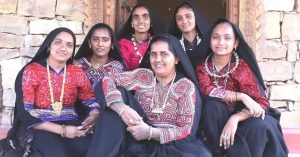A Digital Dukan for Kaarigars

Image by Kaarigar Clinic
The handicrafts sector is the second largest employment generator in India, providing employment to more than 7.3 million people. According to the national census of handicrafts, the Indian handicrafts industry is a billion dollar industry (worldwide) and contributes to 2% of the global market. According to the UN, over the past 30 years, the number of Indian artisans has decreased by 30%.
Many such crafts are the sole domain of the women in the household — providing them social and financial independence without having to leave their homes. While many have adopted modern techniques most of the traditional clusters are witnessing gradual decay and decline due to many reasons. The biggest factor for the decay of traditional clusters is the lack of product orientation to market demand and their inability to understand and link with markets. In the absence of appropriate market linkage several of these livelihood options cease to be remunerative and are consequently abandoned by the artisans: who are then forced to migrate to work as unskilled labor in urban markets.
Over the past many decades several NGOs have been supporting the revival of these traditional clusters in rural India through the creation and nurturing of women’s artisanal collectives. The NGOs have largely been spearheading the forming of groups, promoting SHGs, training in both traditional and new skills, capacity building and the gathering of resources for all of the above. In more established clusters, an oft seen model is an NGO providing the above services using grants from large donors, a microfinance arm supporting the SHGs in the cluster and extending micro credit to the artisans and a for-profit arm taking the artisanal products to both national and international markets. While this has been remunerative for the artisans, the artisan herself has become invisible in this faceless go-to-market model with her identity, pride and sense of dignity lost somewhere in this supply chain.
Can we create a face-to-face market for artisans and if so how? This question led Nilesh Priyadarshi, a research fellow from Gujarat Vidyapith to come up with the idea of a “Kaarigar Clinic,” India’s first rural business clinic for kaarigars (artisans) that helps rural artisans strengthen their traditional businesses. It helps to create and sustain micro enterprises in rural areas for people, particularly women artisans; who do not have the formal education, resources, technology know-how and the business skills to start their own businesses. The unique mission of Kaarigar Clinic is to develop these artisans as entrepreneurs and help them to generate livelihoods for themselves and other artisans and to keep them from abandoning their traditional crafts and migrating. This has not only helped them to preserve their traditional culture and crafts but has also helped to generate incomes from the same.
Most rural cooperatives are either struggling to survive or fail in their nascent stage. According to the team at Kaarigar Clinic there are many reasons behind this, but the common contributors are the lack of appropriate market linkage, technology upgradation and product innovation and they feel that the people involved in these cottage industries do not have the ability and skills to enable them to understand market needs and changes. Kaarigar Clinic provides the platform for individual rural artisans, rural cooperatives and micro enterprises to join hands with this platform and sustain their businesses. The team at Kaarigar Clinic helps to diagnose their strengths, weaknesses, their potential and their USPs and thereafter, continuously handholds these artisans to develop strong and sustainable business models.
With Information and Communication Technology (ICT) as one of its main solution pillars, the organisation has been advocating for individual artisanal brands which give the artisans concerned the value, recognition and dignity they deserve. They started their project with a Rabari artisan called Pabiben and launched her brand Pabiben.com — the first women’s artisanal brand. Today, Pabiben has become a face for women’s empowerment and earns 25 lakhs a year while supporting 150 women artisans in her community. For Kaarigar Clinic Pabiben.com was also a business model prototype which they have since successfully replicated with other artisans.
Most artisans do not have a permanent place to market their products, do not have access to quality raw material supply and do not have direct connections with buyers. This has been further exacerbated by the current pandemic and its effect on the tourism industry. Artisans living in remote villages are not mapped so it is difficult for prospective customers to find them, know about their craft or buy their products. Artisans also face other management problems as they do not have a proper record of their inventory, their sales figures and do not even know the best selling and least selling products. While several E-commerce marketplaces for artisanal products exist, they charge high margins and do not directly connect artisans with buyers.
Kaarigar Clinic’s emphasis on ICT use has helped to address all of these issues. To go a step further, the team at Kaarigar Clinic is developing Kaarigar ki Dukan a local digital marketplace which will connect local artisans, suppliers and buyers within 100 km radius as a first and then domestic buyers and suppliers subsequently. The platform will allow artisans to open their own digital dukan (shop) on the platform and operate it at zero margins. Artisans living in remote villages will be able to upload their profiles, portfolios, videos and their contact details giving them a ‘digital identity and digital address’ as part of opening shop.
Additionally, this artisan friendly platform will include MIS services for artisans to upload and manage their inventories, sales and other business details — anywhere and anytime. Artisans will be able to share details of their dukan via email, WhatsApp or other social media platforms. This will help customers to locate local artisans, browse their products and then make direct purchases. Domestic and international buyers too will be able to register and connect directly with artisans to place their orders.
At this time, there is no single platform which brings together artisans, suppliers and buyers and allows for their interactions and transactions. For digital space on the platform, it is envisaged that artisans will pay a small monthly rental of Rs 300. Artisans will then be free to scale up their businesses both locally, nationally or internationally.
This platform is under development and the team is confident that it would greatly benefit the ‘more than 200 million artisans’ in rural India. The plan is to take this across the country and have state level teams who will onboard artisans, suppliers and buyers in their respective states and also continue to handhold local artisans. The team at Kaarigaar Clinic is confident that the projected numbers will make Kaarigar ki Dukan a self sustaining business venture while still retaining its social purpose.
As our team talks to artisans working with Pabiben Rabari, Rajiben Vankar and others in order to assess the efficacy of this Gandhian model of rural development, Nilesh Priyadarshi and his team envision developing a 1000 such micro artisanal entrepreneurs and create self-sufficient and sustainable livelihoods for 1,00,000 families across rural India.
References:
Priyadarshi, N. & Patel, S. Kaarigar Clinic: Rural Business Clinic for Kaarigars. Gujarat Vidhyapith
https://artisanscentre.com/blogs/past-exhibitions/nilesh-priyadarshi-kaarigar-clinic
Kaarigar Clinic-Rural Business Hub-Start Up. Presentation (ppt)by Nilesh Priyadarshi, Ph.D Research Scholar, Gujarat Vidhyapith
This research was developed as part of the Bharat Inclusion Research Fellowship.
